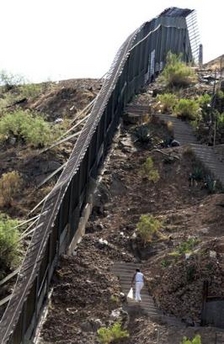The Senate agreed to give millions of illegal immigrants a shot at U.S.
citizenship and backed construction of 370 miles of triple-layered fencing along
the Mexican border Wednesday, but prospects for legislation clearing Congress
were clouded by a withering attack against President Bush by a prominent House
Republican.

A man carries
grocieries up steps along the wall that lines the border with the United
States in Nogales, Mexico, Wednesday, May 17, 2006. For those who live
along what is known simply in Spanish as 'la linea,' - or 'the line,' some
worry that the buildup of troops could spark violent confrontations.
[AP] |
"Regardless of what the president says, what he is proposing is amnesty,"
said Rep. James Sensenbrenner, R-Wis. the lawmaker who would lead House
negotiators in any attempt to draft a compromise immigration bill later this
year.
The blast by Sensenbrenner, chairman of the House Judiciary Committee, came
on the day the White House dispatched top presidential aide Karl Rove to ease
the concerns of rebellious House Republicans, and also coincided with a clash
among GOP senators on the Senate floor.
"This is not amnesty, so let's get the terms right," Sen. Chuck Hagel (news,
bio, voting record) of Nebraska lectured fellow Republicans who condemned the
bill. "Come on. Let's stop the nonsense."
"It sort of reminds me of the famous line, `Methinks thou dost protest too
much,'" responded Sen. David Vitter, R-La., who repeatedly described the
legislation as an amnesty bill for lawbreakers.
Rhetoric aside, the votes on the Senate floor gave fresh momentum to
legislation that closely follows Bush's call for a broad bill. The measure
includes steps to secure the borders, the citizenship-related provisions for
illegal immigrants and a new guest worker program for as many as 200,000 people
a year. Senate passage appears likely next week.
The political wheels turned as demonstrators massed within sight of the
Capitol demanding greater rights for immigrants, the latest evidence of rising
passions in connection with efforts to write the most significant overhaul of
immigration law in two decades.
With the administration eager to emphasize its commitment to border security,
officials continued to flesh out details of Bush's Monday night announcement
that he would send up to 6,000 National Guard troops to states along the Mexican
border.
Lt. Gen. Steven Blum, chief of the National Guard Bureau, raised the
possibility that Guard members could be sent over the objections of a state's
governor.
"If a governor truly did not want this mission performed in their state, then
the option is there for the president and the secretary of defense to federalize
the Guard. And then the mission would be conducted, and then it would be without
the control of the governor," he said.
Vitter led the drive to strip from the bill a provision giving an eventual
chance at citizenship to illegal immigrants who have been in the country more
than two years. His attempt failed, 66-33, at the hands of a bipartisan
coalition, and the provision survived. In all, 41 Democrats joined with 24
Republicans and one independent to turn back the proposal. Opponents included
the leaders of both parties, Sens. Bill Frist, R-Tenn., and Harry Reid, D-Nev.
Thirty-one Republicans and two Democrats supported Vitter's amendment.